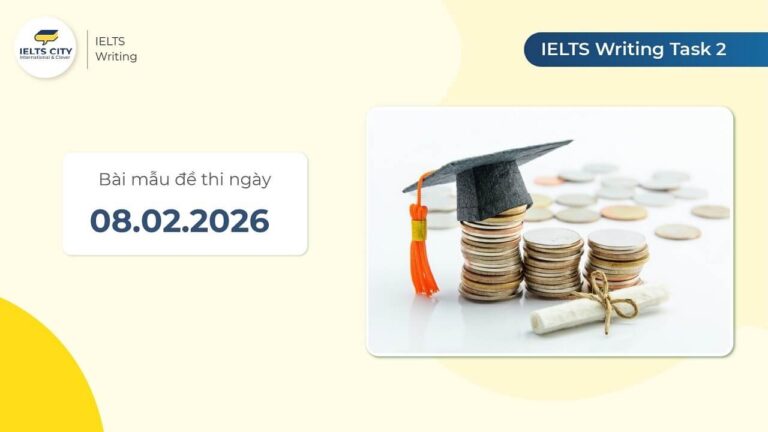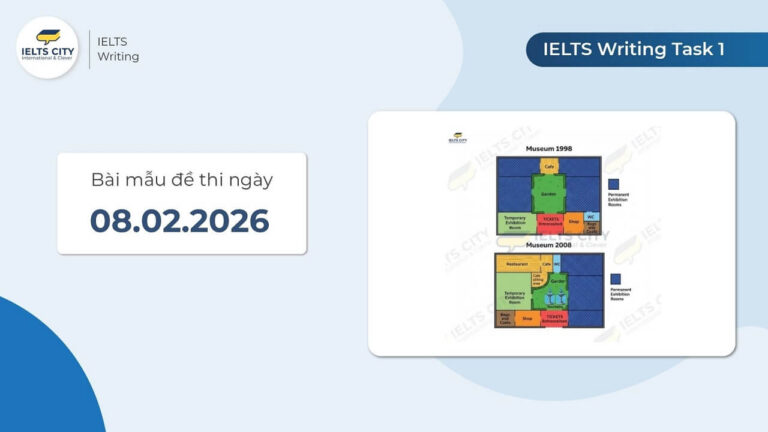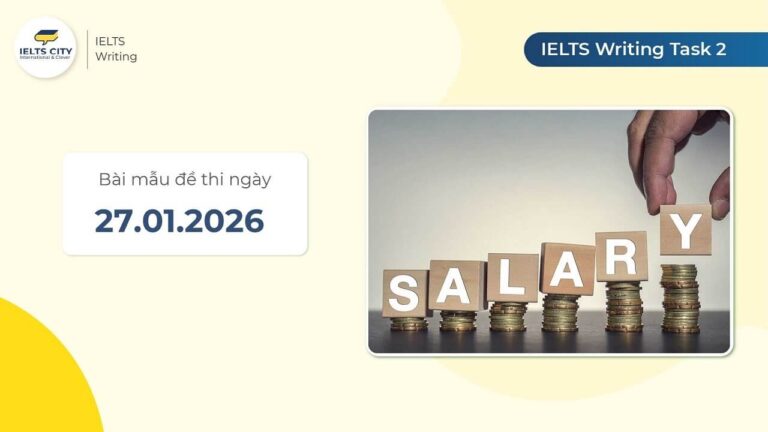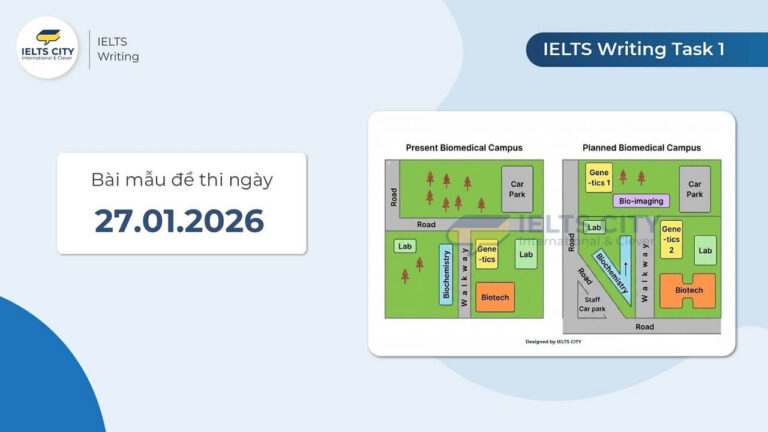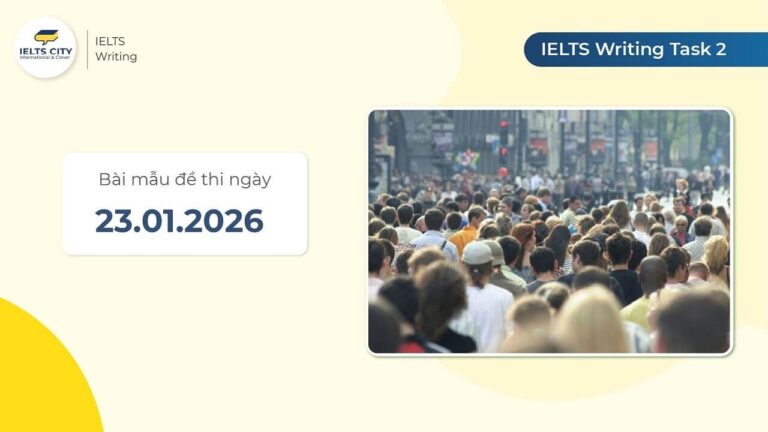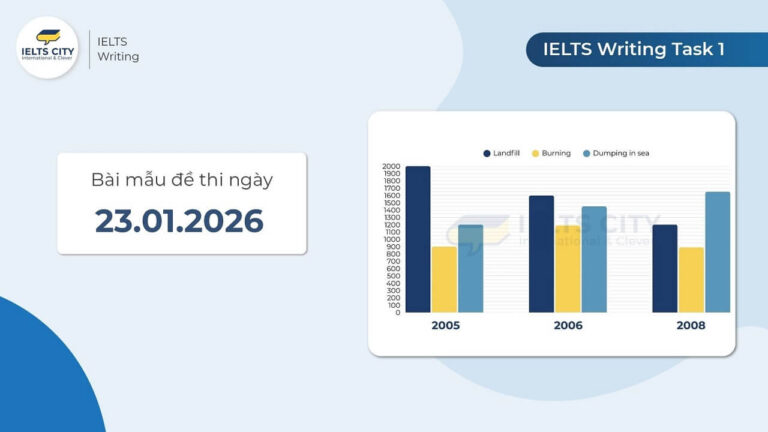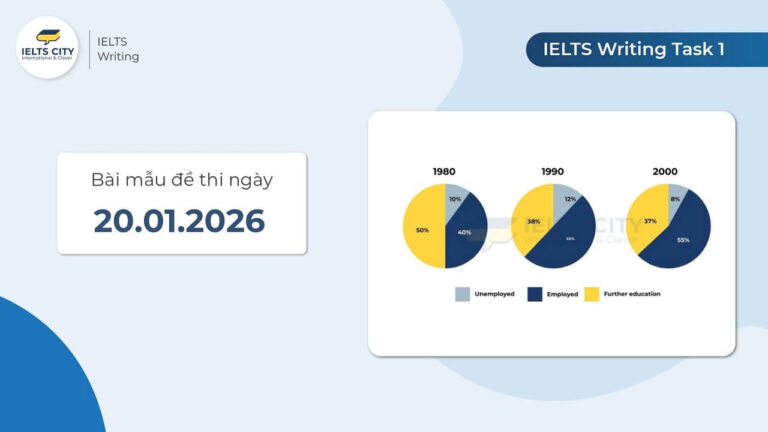Đề thi IELTS Writing Task 2 ngày 15.04.2023 là dạng đề Agree or Disagree về vai trò quan trọng của Trường học trong việc cung cấp cho trẻ em sự giáo dục học thuật lẫn phát triển nhân cách. Bạn có đồng ý với nhận định này không và hãy cùng IELTS CITY tham khảo dàn ý, bài mẫu band 7.5+ và từ vựng liên quan trong bài mẫu sau đây nhé!
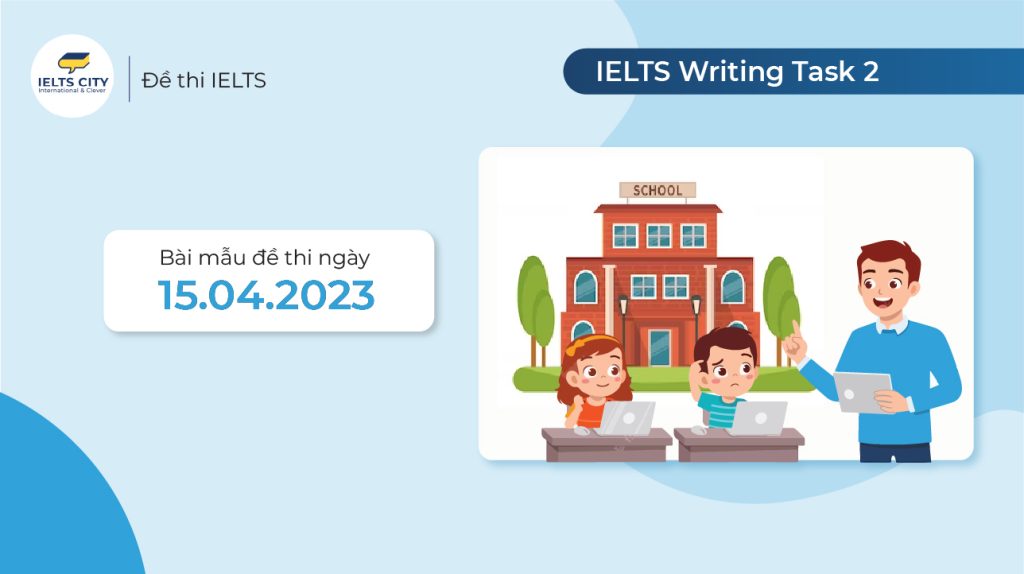
Nội dung chính
Toggle1. Đề thi IELTS Writing Task 2 ngày 15.04.2023
Task 2: It is the responsibility of schools to teach children good behavior in addition to providing formal education. To what extent do you agree or disagree?
2. Dàn bài
- Introduction:
- Giới thiệu chủ đề bài viết bằng cách paraphrase đề bài: Schools have an important role in children’s academic and character education.
- Thesis statement (nêu ý kiến của người viết và/hoặc mục đích của bài viết): I disagree that this is only the school’s responsibility because parents also have huge influence on children.
- Body paragraph 1:
- Main idea: Giving children academic education is a shared responsibility of schools and families.
- Explanations:
- Teachers can formally and scientifically guide the learning process both at school and through homework.
- A child usually develops a learning mindset by watching their own parents.
- Example: A recent survey: 72% of kids who frequently read with parents before bedtime during early years → regular readers as adults. Kids who only played on a technological device → only 19%.
- Body paragraph 2:
- Main idea: Developing children’s character is also a mutual task of schools and families.
- Explanation: Children learn from all those who they are close to (parents, siblings, grandparents, teachers and friends).
- Examples:
- There are things teachers cannot fully model for children, such as keeping a good schedule for bedtime, honoring parents, respecting neighbors, controlling screen time, solving conflicts, etc.
- When children are taught to stop at red lights or put trash in the right places but see their parents break traffic and environmental laws, it can be useless.
- Conclusion: Families and schools share the responsibility of teaching children academic knowledge and personality traits.
3. Sample answer 7.5+
Schools are known to play a vital role in providing children with both academic and character education. However, I would object to the idea that these responsibilities belong exclusively to schools because parents are also a tremendous source of influence on children.
To start with, educating a child academically is a mission shared by teachers and parents. On one hand, teachers are qualified instructors whose profession enables them to formally and scientifically guide the learning process both at school and through designed homework assignments. On the other hand, the learning mindset of a child is usually nurtured in their home environment by no one else other than their own parents. A recent survey shows that up to 72% of kids who were frequently involved in bedtime reading with their parents during their early years become regular readers as adults. The figure is much lower (19%) for kids who would be given a technological device to entertain themselves.
Furthermore, schools and families also have a reciprocal relationship in the development of children’s character qualities. Indeed, children learn from all those who they are close to, ranging from their parents and other family members, including siblings and grandparents, to teachers and friends. In fact, there are several behaviors that teachers cannot fully model for children, such as establishing a disciplined schedule for bedtime, honoring parents, respecting neighbors, regulating screen time, solving conflicts, and so much more. Moreover, it can be pointless when children are taught to, for example, stop at red lights or put trash in appropriate spots but see their parents violate traffic and environmental laws.
In conclusion, it is my firm conviction that schools and families have mutual significance in fostering both academic competence and personality traits in children.
289 words – Band 7.5+ – Written by IELTS CITY
Tham khảo: Bài mẫu IELTS Writing Task 1 ngày 15.04.2023 (Dạng Line Graph)
4. Từ vựng highlight
- Vital /ˈvaɪtl/ [adj]: necessary or essential in order for something to succeed or exist (quan trọng).
- Object to something [v]: to say that you disagree with or oppose something (phản đối). Lưu ý: trọng âm của từ ‘object’ rơi vào âm tiết thứ hai.
- Exclusively [adv]: completely; without including anybody or anything else (duy nhất).
- Tremendous /trəˈmendəs/ [adj]: very great (to lớn).
- Mission [n]: an important official job that a person or group of people is given to do, especially when they are sent to another country (sứ mạng).
- Qualified [adj]: having passed the exams or completed the training that are necessary in order to do a particular job; having the experience to do a particular job (có chuyên môn).
- Profession [n]: a type of job that needs special training or skill, especially one that needs a high level of education (trình độ chuyên môn).
- Nurture something [v]: to help somebody/something to develop and be successful (nuôi dưỡng).
- Reciprocal /rɪˈsɪprəkl/ [adj]: involving two people or groups who agree to help each other or behave in the same way to each other (tương hỗ).
- Model something [v]: to set an example of behavior that you want other people to copy (làm gương về hành vi gì đó).
- Establish something /ɪˈstæblɪʃ/ [v]: to start or create an organization, a system, etc. that is meant to last for a long time (thiết lập).
- Disciplined /ˈdɪsəplɪnd/ [adj]: trained to obey rules and orders and behave in a way that shows control (có kỷ luật).
- Conflict [n]: a situation in which people, groups or countries disagree strongly or are involved in a serious argument (xung đột). Lưu ý: trọng âm của từ này rơi vào âm tiết thứ nhất.
- Appropriate /əˈprəʊpriət/ [adj]: suitable, acceptable or correct for the particular circumstances (phù hợp).
- Violate something [v]: to go against or refuse to obey a law, an agreement, etc. (vi phạm).
- Conviction [n]: a strong opinion or belief.
→ My firm conviction is that… OR It is my firm conviction that …
- Mutual /ˈmjuːtʃuəl/ [adj; only before nouns]: shared by two or more people (của chung).
- Foster something [v] = nurture something.
- Competence [n]: the ability to do something well (năng lực).
- Trait [n]: a particular quality in your personality (phẩm chất).
Đăng ký nhận tư vấn miễn phí
Ưu đãi học phí lên đến 50%
& Cơ hội nhận học bổng trị giá 4.000.000 VNĐ
Đăng ký nhận tư vấn miễn phí
Ưu đãi học phí lên đến 50%
________
5. Bản dịch
Các trường học được biết là đóng một vai trò quan trọng trong việc cung cấp cho trẻ em sự giáo dục học thuật lẫn nhân cách. Tuy nhiên, tôi sẽ phản đối ý kiến cho rằng những trách nhiệm này chỉ thuộc về nhà trường vì cha mẹ cũng là một nguồn ảnh hưởng to lớn đến trẻ.
Đầu tiên, giáo dục một đứa trẻ về mặt học thuật là nhiệm vụ chung của giáo viên và phụ huynh. Một mặt, giáo viên là những người hướng dẫn mà trình độ chuyên môn của họ giúp họ dẫn dắt quá trình học tập một cách chính thức và khoa học cả ở trường và thông qua các bài tập về nhà được thiết kế sẵn. Mặt khác, tư duy học tập của một đứa trẻ thường được nuôi dưỡng trong môi trường gia đình bởi không ai khác ngoài cha mẹ của trẻ. Một cuộc khảo sát gần đây cho thấy có tới 72% trẻ em thường xuyên cùng đọc sách với cha mẹ trước khi đi ngủ trong những năm đầu đời trở thành độc giả thường xuyên khi trưởng thành. Con số này thấp hơn nhiều (19%) đối với những đứa trẻ được giao cho một thiết bị công nghệ để tự giải trí.
Hơn nữa, nhà trường và gia đình còn có mối quan hệ tương hỗ trong sự phát triển nhân cách của trẻ. Thật vậy, trẻ em học hỏi từ tất cả những người mà trẻ gần gũi, từ cha mẹ và các thành viên khác trong gia đình, kể cả anh chị em và ông bà, cho đến giáo viên và bạn bè. Trên thực tế, có một số hành vi mà giáo viên không thể làm mẫu đầy đủ cho trẻ, chẳng hạn như thiết lập giờ giấc ngủ nghỉ có kỷ luật, tôn trọng cha mẹ, tôn trọng hàng xóm, điều chỉnh thời gian sử dụng thiết bị điện tử, giải quyết xung đột, v.v. Hơn nữa, có thể là vô nghĩa khi trẻ em được dạy về việc dừng đèn đỏ hoặc bỏ rác vào nơi thích hợp, chẳng hạn, nhưng lại thấy cha mẹ vi phạm luật giao thông và luật môi trường.
Tóm lại, tôi tin chắc rằng nhà trường và gia đình có tầm quan trọng chung trong việc bồi dưỡng năng lực học thuật và đặc điểm nhân cách ở trẻ em.
Hy vọng rằng với bài mẫu đề thi IELTS Writing Task 2 ngày 15.04.2023 phía trên sẽ giúp các bạn nắm được cách triển khai ý và ghi điểm thật cao khi gặp dạng đề này. IELTS CITY chúc các bạn học tập thật tốt & đạt band điểm IELTS Writing thật cao nhé!
Các bạn có thể tham khảo thêm đề thi IELTS Writing 2023 được cập nhật liên tục bởi IELTS CITY từ IDP & BC để có thể nắm được xu hướng ra đề thi IELTS Writing mới nhất và đầy đủ nhất trong năm 2023 này nhé!
Nếu các bạn đang tìm kiếm khóa học luyện thi IELTS uy tín tại TPHCM, tham khảo ngay các Khóa học IELTS cam kết đầu ra tại IELTS CITY.


